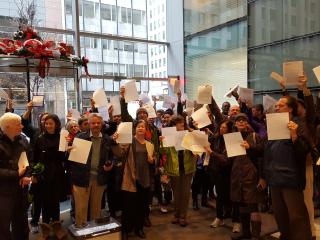How utilities use your money to block you from going solar


It is no secret that monopoly utilities across the country are working to stymie the growth of rooftop solar. What is less understood is how utilities have found a way to use money from ratepayers to arm themselves in this fight. Utilities have done so by accounting for the cost of dues to organizations that engage in political activity when they file to raise our utility rates. A report by the Energy and Policy Institute tracked this practice across the country.
The largest recipient of ratepayer money has been the Edison Electric Institute (EEI). It is the main trade association for the utility industry. EEI is primarily funded through dues from its member-companies. The organization’s annual budget as of 2015 was $90 million. Between 2004 and 2015 the organization spent more than $130 million on lobbying of elected officials. Beyond direct lobbying, the organization works to make administration-level rules friendlier to the utility industry. This includes work on items such as the Clean Power Plan and the ozone rule.
“A rate case popped up in Florida with Florida Power and Light and that’s when we saw millions of dollars going to the Edison Electric Institute at the expense of customers,” said Matt Kasper of the Energy and Policy Institute. “We put together more research and put together a report. We realized this is happening everywhere investor-owned utilities operate.” Kasper argues up to 70% of what EEI does work should not be charged to ratepayers.
EEI is a valuable resource for utilities because its individual member companies are forbidden under state and federal law from using ratepayer money for political activities. Working through EEI allows them to skirt these laws.
Utilities in regulated markets must have the rates they charge customers approved by state utility commissions. Commissions are charged with ensuring that ratepayers are protected from unfairly high rates. Utility commissions adjudicate rate cases through proceedings that operate similar to trials. Utilities are required to provide evidence to justify why their proposed rate is a fair accounting of the cost to deliver electricity to the customers the utility serves. Likewise, ratepayer advocates have an opportunity to provide evidence that counters utility claims.
One organization that has fought successfully against utilities is The Utility Reform Network (TURN). TURN has prevented utilities from using more than $1 million of ratepayer money on dues to EEI. In testimony before the California Public Service commission, TURN highlighted EEI’s advocacy campaign against solar in Arizona as an example of the organization’s political activities that ratepayers should not be required to fund.
“It is outrageous for utilities to try to pass the costs of their political activities to customers,” said Mindy Spatt of TURN. “These expenses in no way benefit customers, and should not be included in rates.” Spatt said her organization discovered this misuse of ratepayer money through their regular review of utility spending.
EEI has been vocal in attacking net metering, the system by which solar owners receive compensation for the solar electricity they generate. Monopoly utilities, and thus their trade association, see distributed rooftop as a competitor. EEI argues for changes to rules around net metering which purposely decrease the profitability of solar.
Kasper said ratepayer advocates have a challenge in fighting back against this utility practice. The portion of ratepayer money that goes to lobbying organizations is a small portion relative to the size of the overall rate increase the utility will seek. Advocates may not have the resources to fight over an ask of several hundred thousand dollars, when billions of dollars are at stake. He’s hopeful this report will awaken public utility commissions to the practice. He recommends that advocates ask for dues spending in the rate case procedure’s discovery phase.
“Not a lot of people know of the Edison Electric Institute, but I think they would get very upset to know their money when they pay their electric bill goes to this type of organization,” Kasper said. “[Utility] commissions and commission staff can make sure ratepayers are protected.”
